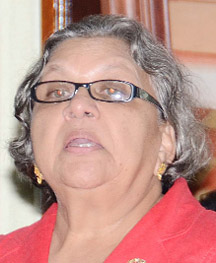The government has ap-proved the appointment of the governing board of the Guyana National Broad- casting Authority which will be headed by former Minister of Human Services and Social Security, Bibi Shadick.
“This is… subsequent to the commencement order identifying that the Broadcast Act of 2011 has come into force,” Head of the Presidential Secretariat, Dr. Roger Luncheon said at his post-Cabinet media briefing yesterday. He said that the governing board will be chaired by Shadick and the other six members are Margo Boyce, Gerry Gouveia, Norman McLean, Dr. Dindial Permaul, Charles Ramson Jr and Sherwood Lowe who was nominated by the Leader of the Opposition.
Observers say the government might have to initially justify the choice of its appointees as several of them have not been involved in broadcast matters. Lowe had been a member of the previous committee on broadcasting that had been agreed between former President Bharrat Jagdeo and late PNC Leader Desmond Hoyte.

“The governing board is tasked statutorily with licensing in the broadcast sector and ensuring compliance among broadcasters with the provisions of the Broadcast Act,” Luncheon pointed out.
Questioned on whether one of the Board’s immediate priorities would be processing applications for licences that have been there for a while, Luncheon said that this would be most obvious and quite reasonable. He noted that broadcast licences have not been issued as agreed to, for a number of years. “That has not of course prevented applications from being made. I am not certain how many applications actually are before or at the National Frequency Management Unit (NFMU) where they are generally sent for processing but I would suspect there are a tidy few,” he said.
The initial location for the board would be at the NFMU on Hadfield Street but there are plans on the drawing board to establish an office that minimally would house the Broadcasting Authority and provide office space for the governing board of the Broadcast Authority, Luncheon said. He added that the opportunity would be used to build to accommodate expanded services to be offered by the successor to the NFMU but that would be a matter subsequent to legislation that is before parliament right now. He was referring to the Telecommunications (Amendment) Bill.
The Broadcast Act was passed in June 2011 without the support of the PNCR, the main opposition party at the time. It envisages the establishment of the National Broadcasting Authority with a Governing Board, which will comprise not less than four and not more than seven persons, one of whom shall be its Chairperson. The Authority will be responsible among other things for establishing classes of licences, the issuing of licences for terms not exceeding ten years and for the suspension and revocation of licences.
In May, US Ambassador to Guyana, Brent Hardt said that while it is encouraging that government has taken steps to free the airwaves and end the model of limited, state-influenced radio, it is important that the process going forward comes under the purview of an impartial and transparent National Broadcasting Authority.
Government controversially approved radio licences for 11 entities last year, including Television Guyana (TVG) Channel 28, Hits and Jams Entertainment and the National Television Network (NTN). Prime Minister Samuel Hinds made the disclosure in March this year in a written response to a question from AFC MP Khemraj Ramjattan.
Approval of requests for licences was also given to the Matthews Ridge Community Council, Little Rock Television Station, Afro Alphonso and Sons Enterprise, New Guyana Company Limited (NGCL), Wireless Connections, Rudy Grant, Telecor and Cultural Broadcasting Inc and Linden Wireless Communication Network.
Several other applications which had been before the NFMU were not considered and critics said that awards were made mostly to applicants that the government was comfortable with. Observers say it is expected that this process will begin afresh now that the broadcasting is being finally established.
When it acceded to office in 1992, the government had promised to liberalise the broadcasting sector but it took almost 20 years before new licences were finally issued.




